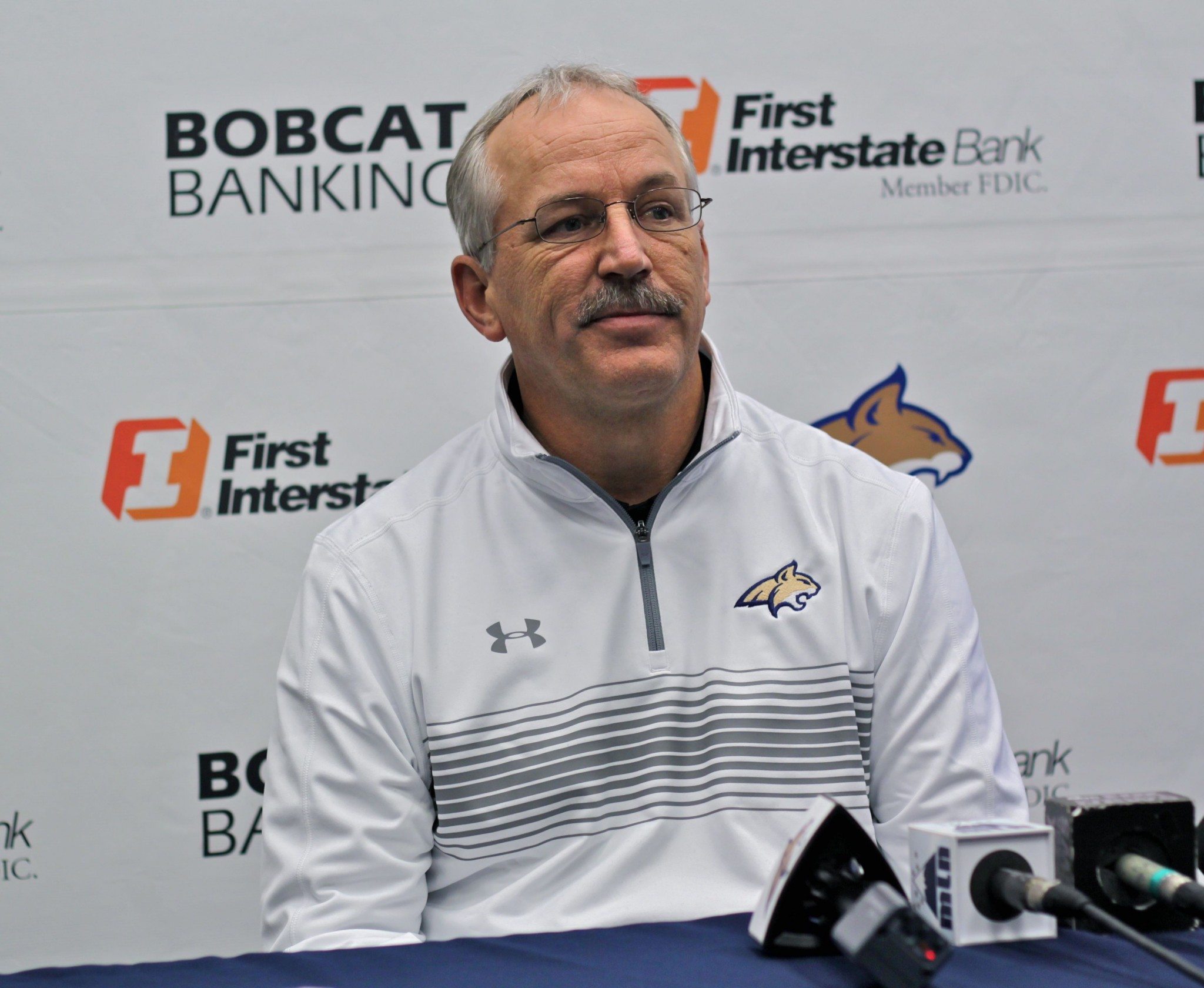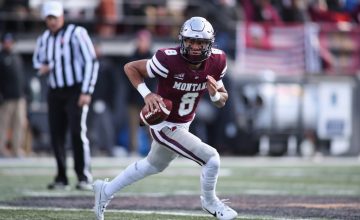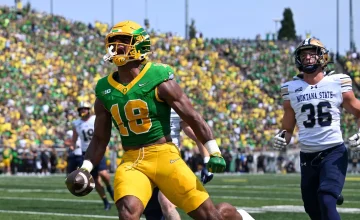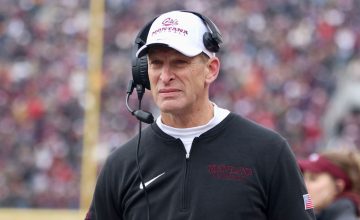Courtney Messingham was Jeff Choate’s wild card.
Choate, Montana State’s new head football coach, filled out his coaching staff quickly after being hired on December 4. Choate retained Kane Ioane, Bo Beck and Michael Pitre from Rob Ash’s staff days after his announced hiring. Choate added former Rocky Mountain College head coach Brian Armstrong as his offensive line coach that same day. A day later, Choate hired Matt Miller and Byron Hout to coach wide receivers and defensive line, respectively. Montana Western head coach B.J. Robertson was added as the director of high school relations. After a week on the job, Choate would drop a bombshell, announcing Montana defensive coordinator Ty Gregorak would join the MSU staff in the same capacity.
Ioane, Beck and Pitre have already spent multiple years each in Bozeman. Armstrong, Robertson and Choate have ties that go back to Montana Western in the mid-1990s. Hout and Miller played for Choate at Boise State. Gregorak has been a part of one of the fiercest rivalries in college football since 2003.
With the staff almost in place, many wondered who Choate would bring in as his offensive coordinator. A season ago, MSU led the Big Sky Conference and ranked third nationally by averaging 43 points per game. Junior quarterback Dakota Prukop earned Associated Press first-team All-America honors by piling up 39 total touchdowns. But Tim Cramsey, the maestro of the up-tempo spread option attack, was not retained. And Prukop announced he would transfer to Oregon just days after Choate’s hiring.
On December 17, Choate finalized his staff by hiring Messingham, a coach with diverse experience but one that Choate had never crossed paths with in his 20-plus years as a football coach.
“I didn’t know Courtney personally,” Choate said earlier this month. “I started calling guys who I thought might have interest in the job. And as luck would have it, all of them had better jobs, which was awesome for them. They were either in position to take FBS coordinator jobs or position coach jobs but it was ironic because one night I called three guys and all three of them unprompted mentioned his name. So I figured someone was trying to tell me something.
“So I had some other conversations with some other people so I circled back, started doing my homework, calling people who I knew had relationships with him in the past. And then I called him and had a long conversation with him and then I called some other people who knew him. I felt there was a lot of reasons why he would be a really good fit. He’s a very smart coach. He’s operated in a number of very different systems. I think he was in line with me philosophically. I think he’s an older and more mature coach who is going to help navigate some of the learning curve that some of our younger guys have and be a steadying hand on that side of the ball. I think he’s in a place in his career where he is excited about coming to Montana State.”
Messingham was Iowa State’s offensive coordinator in 2012 and 2013. He’s spent the last two seasons as a quality control offensive assistant on Kevin Wilson’s staff at Indiana. Messingham’s resume includes play-calling duties in the Big XII and an appearance with Indiana in last month’s Pinstripe Bowl as well as stints as a junior college coordinator and small-college head coach.
Messingham was a four-year letterman as a quarterback and defensive back at Northern Iowa, where he attained a Bachelors of Technology degree in 1990, and his 25-year career began as offensive coordinator at St. Ambrose University (1991-92) while completing his MBA at UNI (which he earned in 1992). He worked as offensive coordinator at Iowa Lakes Community College (1993-95), then coached receivers at Division II Truman State in Missouri (1996-98), working as offensive coordinator the last two of those seasons.
The Waterloo, Iowa, native moved to Missouri State as receivers coach in 1999, taking over offensive coordinator duties the next season. In 2003 he became Upper Iowa’s head coach, leaving that post in 2005 for Southern Miss. He coached Eagles receivers in 2005-06, and running backs in 2007 (also serving as recruiting coordinator). He moved to Iowa State in 2009, coaching tight ends (2009-10), receivers (2011), and quarterbacks (2012-13, also serving as offensive coordinator those two seasons) with the Cyclones.
Messingham will be Montana State’s fourth offensive coordinator this decade. MSU has three redshirt freshmen quarterbacks — Jorday Hoy, Brady McChesney, Ben Folsom — on its roster. The Bobcats also added junior Tyler Bruggman, a Scottdale Community College transfer who spent time at Washington State and Arkansas State, earlier this week.
During the first week of January, Montana State hosted press conferences with each of Choate’s nine new assistant coaches. Last Thursday, Messingham and Ioane sat down with Skyline Sports and media from around Montana.
Ted Dawson, KBZK: How would you describe your offensive philosophy?
Courtney Messingham: “The first thing we have to do is we have to take care of the football and we have to be physical. My philosophy is going to be one that every opportunity you get, make sure you are trying to set the tone. The guys up front have to be the guys who set that tone and that’s by coming off the ball and being physical.”
Dawson: How do you do that? How do you get that into a team?
Messingham: “I think it’s a mindset that starts from Day 1 and it really starts in the weight room and the way you go about talking about how you do things. Our weight staff here will do a great job of setting the tone and they will start right back at it as soon as the kids get back to class.”
Dawson: With Dakota gone, what do you think of the quarterback (Hoy) and how he fits into your offensive strategy?
Messingham: “The first thing I really have to do is I have to see a little bit what each guy who is going to compete for that job brings to the table. And then we will fit the philosophy, the style of football a little bit around what he brings. But we are still always going to fall back on we are going to be able to run the football and we are going to be physical the way we go about it.
“I talk about it starting with the offensive line but it has to go all the way out to the wide receivers and the way they go about their business on every play no matter if they are attacking the football to make a great play to score a touchdown or if they are blocking so our running back has the opportunity to go make a good play for us.”
Skyline Sports: Can you talk about the process to get to this job? Jeff said you didn’t have much history before this came to be?
Messingham: “Coaching is a lot smaller world than you really realize at times. He and I have got a bunch of mutual friends, close friends. Actually, the last coulpe of years, I’ve been at Indiana University and I’ve really had the opportunity to see some of the things you can really do as far as being physical even though Indiana is kind of what people would call a spread team. But they had a 2,000-yard rusher two years ago and actually had two backs rush for 1,000 yards each this past year. That leads itself into being physical.
“But back to Coach Choate, I’ve known Brian Armstrong, our offensive line coach, for a long, long time. When the opportunity came that Coach Choate was looking for an offensive coordinator, (Armstrong) and I spoke a little bit and then Coach Choate actually spoke with (current Indiana defensive backs coach and former MSU defensive backs coach) Noah Joseph, who used to coach here as well. After Noah had spoken with him, I had the opportunity to get on the phone. We talked for a good while, a little bit about philosophy, a little bit about what are the important things that a program has to have. And also just understanding that really the players in the program are the most important part of that program. Their development, their growth, the experience they have, the ability to get a great education at Montana State University is a big key also for realizing why you should come here, why this is a great place.”
Greg Rachac, Billings Gazette: You’ve been a play-caller at the highest level. Maybe you can talk about how your experience is going to help shape this offense and these players?
Messingham: “Well, I’ve been fortunate. I’ve actually coached at every level of college football, from Division III to junior college all the way to the Power 5 conferences. I’ve been fortunate that I’ve had good players. Because I’ve had good players, it allows you to mold an offense around what they bring to try to get the most out of what each guy brings.
“If you have offensive linemen and you can knock people off the ball and you have a tailback that is a physical, downhill runner then you are probably going to run between the tackles a bunch. If we end up with two running backs who are both very, very good football players but maybe more of a scat-back type, you are maybe going to try to get to the edge a little bit more. But you still have to run with a physical demeanor even if you are running to the edge. We do not want to be an east and west type of running team. We want to be a downhill. You might say, ‘Well are you every going to run outside?’ Sure, you are going to run outside. But your mindset still has to be when I get out there, the corner is going to know I’m bringing it and if he wants to step up and tackle me, he’s going to know I’m trying to bring it to him a little bit.”
Dawson: Coach, this was one of the best offenses in the country last year. How do you improve on that?
Messingham: “Well, to be honest with you, I’m not really going to concern myself with trying to improve on last year’s offense. I’m going to worry about making sure our kids understand our philosophy and we have to understand that the bottom line comes down to whether you win 3-0 or you win 55-52, as a program we are looking to win football games and give ourselves the best opportunity to win each week.”
Parker Gabriel, Bozeman Daily Chronicle: Have you gotten a chance to see what you have here coming back and maybe how that starts to fit?
Along with Prukop, Montana State must replace four offensive linemen, All-America tight end Beau Sandland and senior captain wide receiver Mitch Griebel along with several key backups. MSU returns All-America guard J.P. Flynn, captain running back Chad Newell and versatile running back Gunnar Brekke for their senior seasons. Junior Dylan Mahoney played extensively on the offensive line due to injuries and Mitchell Herbert earned third-team All-Big Sky Conference honors as a sophomore last fall.
Messingham: “I’ve had a chance to look at little bit at some of the pieces that were lost. I’ve also had a chance to look through and see some of the players we have coming back. And then I’ve obviously concentrated on seeing from a recruiting standpoint if we are ready to hit the ground running.”
Skyline: Who are some of your biggest coaching influences?
Messingham: “Most recently, obviously Kevin Wilson, the head coach at IU. I was really kind of fortunate, it might sound odd, but I actually had three head coaches as a player. I played at the University of Northern Iowa. I played for Darrell Mudra and Darrell Mudra won a couple of national championships (Division II national titles at Eastern Illinois in 1978 and 1980), coached at North Dakota State (1963-1965), coached at Florida State (1974-75), coached at every level. Then I had Terry Allen. Then I had Earl Bruce (Ohio State head coach from 1979 until 1987). So I had a range of guys as a guy who knew he wanted to coach as a player.
“Probably the next guy who shaped who my thoughts were was a coach named Ray Jauch. I was fortunate enough as a graduate assistant (at Saint Ambrose) to work for a guy who had won a Grey Cup (in 1975 with the Edmonton Eskimos) as a CFL head coach, had coached in the USFL as a head coach (Washington Federals in 1983 and 1984). He had been all these places, been some big-time places and the first thing he said was, ‘If you ever lose sight that the players are key and you ever lose sight of developing them and making sure that they leave the program that they are better than they were when they came in, then you are missing the boat.’ From an older guy telling you that who had been a lot of different places, it really made it hit home with me.”
Skyline: These last couple of years, Kevin Wilson (former Oklahoma offensive coordinator) a really hot name in college football. Same with Todd Herman (former Iowa State OC, Ohio State OC, current Houston head coach). What did you learn from those guys?
Messingham: “Probably the thing I learned more from both of them when you put the two together is to not be afraid to be aggressive, continue to be aggressive. The biggest thing I probably learned from Kevin Wilson is don’t get your quarterback hit. Be aggressive but if you have to protect with six, you have to protect with seven, do that, get it out of your quarterback’s hand and make sure no matter if it’s a run or a pass that people are going to walk away saying we were in a fight and they were physical.”
Gabriel: What drew you back to this level?
Messingham: “Really, to be quite honest, the opportunity to be a coordinator again, the opportunity to really get back on the field coaching my own position. As a quality control guy at IU, I wasn’t coaching my own position.”
Rachac: Can you talk about schemes or certain things you hope to do?
Messingham: “Not really at this time and not so much that I don’t to. It’s more that until we really get into spring ball and seeing the guys we are truly going to be getting on the field for us, that will be tweaked a little bit. The biggest thing, and I know I’ve said it a few times already, but we are going to be a physical football team.”
Skyline: Recruiting wise, have they told you what your responsibilities will be?
Messingham: “Obviously from a coordinator standpoint, I’m going to try to go see lineman, I’m going to try to go see our tailbacks and our receivers. More than having a specific area, try to go help with guys who might be recruiting Texas. Ok, now I’m going to see some of our skill kids. I say skill kids, I mean I’m going to see all of our offensive guys in general. And then quarterbacks will still be a high priority for me.”
Gabriel: How far do you have to be in terms of knowing personnel and scheme once spring ball starts? Or are you sort of targeting that as when you will start?
Messingham: “No. When we do our winter conditioning stuff, you start evaluating talent right then. The hard part is a guy who will go get after it in the weight room, now you have to see them carry that thing onto the football field. You are going to know their work ethic and you are going to know a little bit their athletic ability. But now how does that translate onto the football field. So I’m excited to really get in and watch them in the weight room a little bit and doing our winter conditioning and that type of stuff.”
Russ Reed, NBC Montana: Talking about your nature of offense, you obviously want to be physical up front and be able to run the football. Is the offensive line going to be your No. 1 priority given you lose four senior starters?
Messingham: “That will be a huge key for Coach Armstrong and myself to figure out how all the pieces fit together. Obviously, there are going to be a bunch of new pieces. The tight end situation is going to be a key piece for us as well. You can run the ball without a tight end but it sure helps if you can stretch the edge a little bit but it sure helps if you have a guy who can help you start the play, get the play started in general.”
Reed: Is that a little more difficult with Bo Beck (former defensive line coach) switching sides to coach tight ends?
Messingham: “No because to be honest with you, the two years I played defense I think helped me more to understand how offenses work. I think it’s an easy transition and I’m excited to have him over on our side.”
Skyline: You mentioned that you’ve known Brian Armstrong for a long time. Where did you guys first meet?
Messingham: “Actually, when he was coaching as a head high school coach in Florida. I met him on the recruiting trail and have always stayed in close contact with him. He’s about as good of down to earth, good person as you can find.”
Skyline: You mentioned Bo and his transition. Having two guys on your side of the ball (along with Pitre coaching running backs) will that help aid your transition?
Messingham: “Very much so. Not only the personalities of the players but it’s one less thing to worry about when you can go ask somebody, ‘Ok, how does it work here at Montana State? What is the norm? What is the way people expect things to happen?’ Those are great guys to be able to bounce questions off of.”
Rachac: You’ve been doing this a long time. There’s a couple of guys on the staff now that are just kind of getting into the business. Just talk about how the staff might mesh together.
Messingham: “I’m excited. I’ll just use Matt Miller as an example. Young guy. I can tell already — he picked me up from the airport when I got here — he’s going to be a sponge. I don’t think he really realizes how much I will get from him though from the things he used and the coaching he got so that a guy my age can somewhat bounce things off of him and say, ‘All right, what are they really thinking? What were you thinking in that situation?’
“Everybody just says it’s just getting open, create your own space as a wide receiver. Well, you just got done playing. Talk to me about that. It’s man coverage, he’s pressed, he’s inside, I want to throw that back shoulder fade. It seems easy to me when it works. You watch Tom Brady do it and it looks like shoot, it’s not all that hard. Yet what are the key things you felt like as a guy who just got done playing? I will definitely pick his brain. But from what I’ve seen, I think he will be a sponge wanting to not only bring things to the table but also learn and I’m excited about that.”
Skyline: Do you have much experience with cold weather or elements Montana might provide late in the season?
Messingham: “I’m old so my dates might be wrong but I think it was about 1986, the University of Northern Iowa came to Montana State. We didn’t have real good gloves at that time (laughs). Cold weather does change things a little bit but it’s a little bit more of a mindset. You might think it’s odd but the coldest game I’ve ever been involved in kicked off at nine degrees and finished at two degrees in Ames, Iowa and we threw for a bunch of yards and ended up totaling more than 500 yards and didn’t have one dropped ball, which was unbelievable. But it was a mindset of hey, it’s just the next thing we have to go attack and we did a nice job with it. Being in the Big XII we had plenty of games where the weather wasn’t what you’d like it to be. I know you think of it as a Southern Conference in general. But it gets cold.”
Dawson: Were you a quarterback?
Messingham: “Yes sir. In 1986, I was actually playing DB and they actually threw about six touchdown passes on us. It is not my greatest memory of college football.”
Rachac: That game was here?
Messingham: “Yes.”
Skyline: What do you think of Montana State as a whole in the short time you’ve been here?
Messingham: “I haven’t been here long. I know that in the short time I’ve been here, the people in the community have been absolutely unbelievable as far as reaching out. I spoke with one of our boosters and his wife gave me her card and said, ‘I know it’s a little thing but if your wife needs a hairdresser, tell her to call me.’ That type of stuff is what you kind of expect when you talk to people who have been here in the past.”
Skyline: How would you evaluate the status of the program you guys are inheriting?
Messingham: “I think it’s a program that is used to winning, expects to put a great product out on the field and I know with Coach Choate’s leadership, that’s what we are going to do.”














